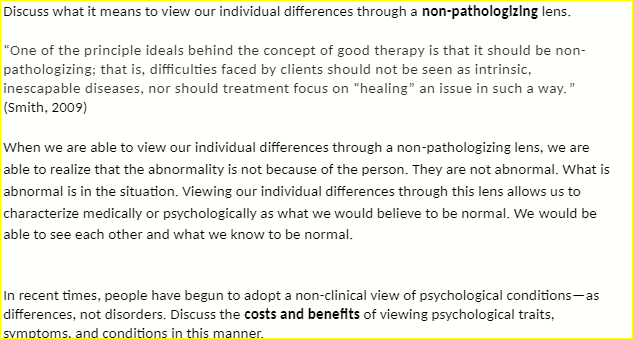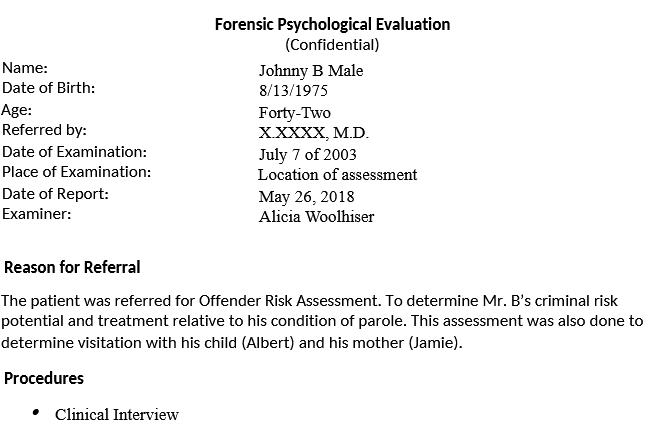-77%
PSY 215 PSY215 Module Eight Activity.docx- Snhu
$3.99$16.99
PSY 215 PSY215 Module Eight Activity.docx- Snhu
Discuss what it means to view our individual differences through a non-pathologizing lens. “One of the principal ideas behind the concept of good therapy is that it should be non-pathologizing; that is, difficulties faced by clients should not be seen as intrinsic, inescapable diseases, nor should treatment focus on “healing” an issue in such a way.” (Smith, 2009) When we are able to view our individual differences through a non-pathologizing lens, we are able to realize that the abnormality is not because of the person. They are not normal. What is abnormal is in the situation. Viewing our individual differences through this lens allows us to characterize medically or psychologically as what we would believe to be normal. We would be able to see each other and what we know to be normal. In recent times, people have begun to adopt a non-clinical view of psychological conditions—as differences, not disorders. Discuss the costs and benefits of viewing psychological traits, symptoms, and conditions in this manner. Viewing psychological traits this way would cut costs on doctors for starters.
Description
PSY 215 PSY215 Module Eight Activity.docx- Snhu
Discuss what it means to view our individual differences through a non-pathologizing lens. “One of the principal ideas behind the concept of good therapy is that it should be non-pathologizing; that is, difficulties faced by clients should not be seen as intrinsic, inescapable diseases, nor should treatment focus on “healing” an issue in such a way.” (Smith, 2009) When we are able to view our individual differences through a non-pathologizing lens, we are able to realize that the abnormality is not because of the person. They are not normal. What is abnormal is in the situation. Viewing our individual differences through this lens allows us to characterize medically or psychologically as what we would believe to be normal. We would be able to see each other and what we know to be normal. In recent times, people have begun to adopt a non-clinical view of psychological conditions—as differences, not disorders. Discuss the costs and benefits of viewing psychological traits, symptoms, and conditions in this manner. Viewing psychological traits this way would cut costs on doctors for starters.
PSY 215 PSY215 Module Eight Activity.docx- Snhu
Itʻll also cut costs for pharmaceutical companies to gain profit. Another benefit would be that it could increase
accessibility to online platforms which would allow for more resources, counseling, medical needs, etc. Lastly, services provided to patients would be therapeutic providing education and support. Think of abnormal behavior that may be viewed as a deficit or a weakness. Discuss how aspects of this behavior may be reframed and reapplied as a strength. Abnormal behavior that is viewed as a deficit would be bipolar disorder. According to the National Alliance on mental illness, “ bipolar disorder is a mental illness that causes
dramatic shifts in a person’s mood, energy and ability to think clearly . So, managing bipolar allows someone to be empathetic towards other people, more aware of their health, and gives you the ability to really two other individuals in a similar situation. Being aware of your health will allow you to take control of your physical and mental health so you’re able to thrive through life. And because of the dramatic shifts in moods, bipolar people are less likely to judge others. Lastly, having the ability to relate to other individuals would allow you to know what they experienced or are currently experiencing.
PSY 215 PSY215 Module Eight Activity.docx- Snhu
- PSY 211 – Lifespan Development (5015 Documents),
- PSY 215 – Abnormal Psychology (4335 Documents),
- PSY 108 – Introduction to Psychology (3759 Documents),
- PSY 223 – Statistics for Psychology Research (2652 Documents),
- PSY 216 – Psychology of Personality (1841 Documents),
- PSY 510 – Research Methods (1748 Documents),
- PSY 520 – Research Methods in Psychology II (1469 Documents),
- PSY 257 – Psychology (1451 Documents),
- PSY 310 – Criminal Psychology (1393 Documents),
- PSY 200 – FOUNDATIONS OF ADDICTIONS (1379 Documents),
Only logged in customers who have purchased this product may leave a review.







Reviews
There are no reviews yet.